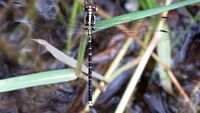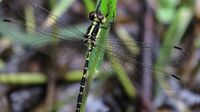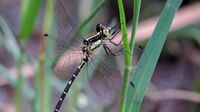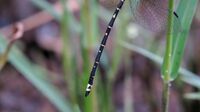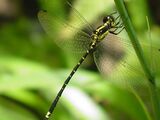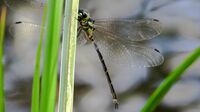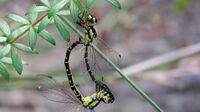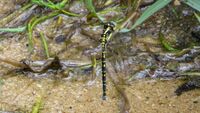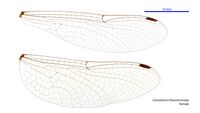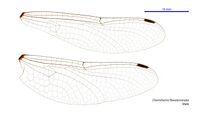Biology:Choristhemis flavoterminata
| Yellow-tipped tigertail | |
|---|---|
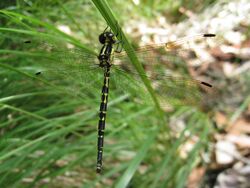
| |
| Female | |
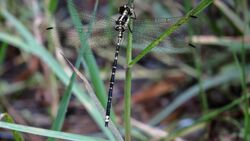
| |
| Male | |
| Scientific classification | |
| Domain: | Eukaryota |
| Kingdom: | Animalia |
| Phylum: | Arthropoda |
| Class: | Insecta |
| Order: | Odonata |
| Infraorder: | Anisoptera |
| Family: | Synthemistidae |
| Genus: | Choristhemis |
| Species: | C. flavoterminata
|
| Binomial name | |
| Choristhemis flavoterminata (Martin, 1901)[2]
| |
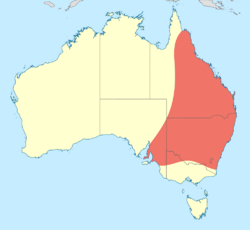
| |
| Synonyms[3] | |
| |
Choristhemis flavoterminata, the yellow-tipped tigertail, is a species of dragonfly from the family Synthemistidae found in New South Wales and Queensland, Australia .[4][5] Yellow-tipped tigertails prefer a warm, wet climate and often reside near rivers where they also lay their eggs.[6] Specimens of this type of dragonfly are noted in the A.N. Burns Collection[7] in Museum Victoria.[8]
Early life
At hatching, the yellow-tipped tigertail's larvae are about 7.5 mm long, and measure 4.1 mm from each side of the head. The abdomen consists of a small quantity of hair, measures 12.1 mm, and is relatively thin. They are light gray or brown in color, later maturing into a deeper shade of that specific color.[9] Larvae burrow into the mud for protection,[9] but they are endangered by underwater predators capable of digging through the mud burrows from the main body of water, and eating the larvae. Once mature, yellow-tipped tigertail larvae become predators, feeding on smaller bugs.[9]
Body
The average yellow-tipped tigertail has a body length around 47 mm. Its body is long, ending with a bright yellow spot, and its abdomen is thin. Its wings have a slight brown tint and a dark brown rectangular spot.[10] Yellow-tipped tigertails are believed to fake death when frightened by folding their legs across their bodies until they no longer feel threatened, at which point they fly away. They do so most commonly when they are lying on their dorsal or ventral surfaces.[11]
Gallery
See also
- List of Odonata species of Australia
References
| Wikimedia Commons has media related to Choristhemis flavoterminata. |
- ↑ Dow, R.A. (2017). "Choristhemis flavoterminata". IUCN Red List of Threatened Species 2017: e.T87538487A87540154. doi:10.2305/IUCN.UK.2017-1.RLTS.T87538487A87540154.en. https://www.iucnredlist.org/species/87538487/87540154. Retrieved 20 November 2021.
- ↑ Martin, R. (1901). "Les odonates du continent australien". Mémoires de la Société Zoologique de France 14: 220–248 [229]. https://www.biodiversitylibrary.org/page/10101226.
- ↑ "World Odonata List". University of Puget Sound. Archived from the original on 28 August 2010. https://web.archive.org/web/20100828091754/http://www.pugetsound.edu/academics/academic-resources/slater-museum/biodiversity-resources/dragonflies/world-odonata-list/. Retrieved 11 August 2010.
- ↑ "2. Scientific Names- Choristhemis flavoterminata (Martin)". Australia: Australian Government. http://www.ento.csiro.au/aicn/name_s/b_1003.htm.
- ↑ "Choristhemis flavoterminata". Global Biodiversity Information Facility. https://www.gbif.org/species/1429662.
- ↑ "Choristhemis flavoterminata" (in English). Australia: Australian Biological Resources Study. http://www.environment.gov.au/biodiversity/abrs/online-resources/fauna/afd/taxa/Choristhemis_flavoterminata.
- ↑ A.N. Burns Collection
- ↑ "Museum Victoria Collection Odonata". Australia: Museum Victoria. http://collections.museumsvictoria.com.au/object.php?irn=1126560&QueryPage=%2Fresults.php.
- ↑ 9.0 9.1 9.2 Tillyard. "The larva of Choristhemis (TILLYARD)". Austria: Biologiezentrum Linz. http://www.biologiezentrum.at/pdf_frei_remote/LBB_0035_1_0657-0660.pdf. Retrieved 11 December 2009.
- ↑ "Brisbane Insects- Choristhemis flavoterminata". Australia: Brisbane Insects. http://www.brisbaneinsects.com/brisbane_dragons/SlenderTigerlet.htm. Retrieved 11 December 2009.
- ↑ Paulson, Dennis; Gutierrez, Rodolfo Novelo (16 February 1999). "Death feigning in dragonflies?". Tacoma, WA. http://mailweb.ups.edu/pipermail/odonata-l/1999-February/000307.html. Retrieved 15 December 2009.
Wikidata ☰ Q2710889 entry
 |

